Community and social investment highlights 2019
Impact snapshot: access to basic services for health, water, and food
- 1 mn people gain access to health services in Libya, Yemen, and Romania.
- 8,500 people gain access to water in Yemen.
- 100,000 people experiencing poverty receive hot meals in Austria.
In 2019, we invested in infrastructure to improve access to basic services, such as health care and water. Our investments focused especially on underprivileged groups or areas with limited access to basic services in our operating countries. Our investments in basic human needs are also in line with our commitment to respecting human rights.
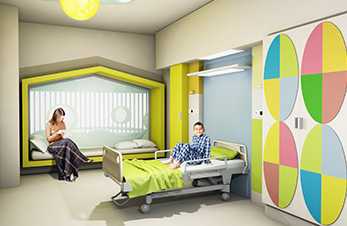
In Romania, OMV Petrom contributed EUR 10 mn to support the construction of the first Children’s Oncological Hospital in Bucharest, the largest single corporate donation in Romanian history. It is estimated that more than 500 children are diagnosed with cancer in Romania every year – over half of them are treated in the two existing centers in Bucharest, which cannot adequately meet their needs. The new hospital will have the capacity to serve 300 little patients a year and significantly increase the country’s capacity to treat pediatric cancer.
In November 2019, also in Romania, 50 colleagues from PetroMed – doctors and nurses – voluntarily joined the Medical Doctors’ Caravan association. This pilot project provides community-based health care in Valea Mare, Dâmbovița county. As a result, 145 retired and low-income people received free medical examinations and consultations.
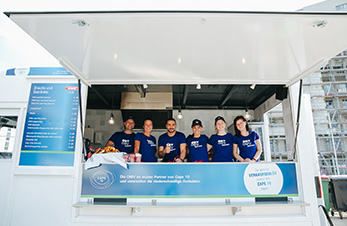
In Austria, OMV is a major financial contributor to the “Cape 10: House of the Future and Social Innovation” project – an innovative social and health services center for people in need in Vienna. Our funds will help establish low-cost health services for women and children in need. In 2019, ten OMV volunteers participated in a Street Festival fundraising event, which raised additional funds for the project.
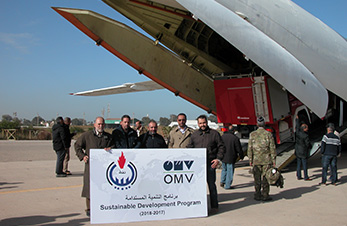
In Libya, our investments contributed to providing essential medical supplies to Benghazi Children’s Hospital, helping around 1 mn people get necessary medical assistance. We also finalized our sustainable development program in the Sirte region with the delivery of a fire truck to improve the emergency response capability of the town of Gialo. In 2019, OMV committed an additional EUR 4.6 mn in social investments in Libya to address the social challenges in neighboring communities by signing a memorandum of understanding (MoU) with its partners in Libya and the National Oil Corporation (NOC). Funds will be directed to projects that improve access to medical services and water and create opportunities for youth, reaching over 500,000 beneficiaries in the coming years.
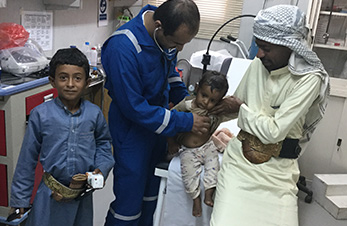
In Yemen, our health clinic remained open to local communities, providing essential medical support in the very remote areas where we operate. Our Health team provides medical support, treatments and checkups for conditions including hypertension, diabetes, and cardiovascular issues as well as psychiatric support and pediatric services to people from nearby settlements. Local communities can also use our 24/7 emergency medical services in case of emergency situations, for example, heart attacks, animal or insect bites, traffic accidents, and similar. In 2019, we also ran a vaccination campaign for local communities to fill in the gaps in national health services. In 2019, on average more than 100 local people received medical assistance in the OMV health clinic each month.
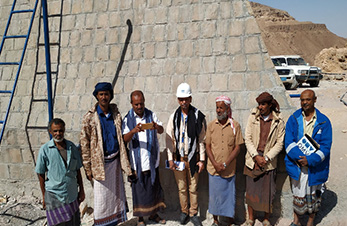
OMV operates in countries experiencing high water stress. We therefore continued to invest in water access infrastructure for neighboring populations in Tunisia and Yemen in 2019. In Tunisia, we committed to rebuilding a water reservoir for the Kembout community, located at the entrance of the desert oil fields, as part of a joint OMV CSR initiative with the National Oil Company ETAP and Eni and Medco in southern Tunisia. The project is being implemented in partnership with the national water company, SONEDE, and replaces an existing water reservoir. It will ensure the supply of freshwater for 1,000 community members. In Yemen, we started two water access projects in 2019, one in the AlMahood area and another in Bakaila village. The AlMahood project will provide two water tanks, one ground reservoir, and a second hill-elevated water storage reservoir to the water authority. This project will benefit more than 8,500 people from 27 neighboring villages (estimated completion in 2020). The second project involves building a water storage facility in Bakaila village, which will facilitate easy access to clean drinking water from an existing water source for around 2,000 people.
Access to food and nutrition is another area of our focus. In Austria, we collaborate with Wiener Tafel – a charity organization helping people affected by poverty in Vienna and reducing food waste. Through this collaboration, 24 employee volunteers had a chance to personally engage in Wiener Tafel’s work. In 2019, we handed over the donation raised in the winter employee engagement campaign, which, when doubled by OMV, amounted to EUR 9,772. This donation helps provide 100,000 meals to people experiencing poverty in Vienna. Our employees donated part of their meal value at several of OMV’s cafeterias to support Wiener Tafel. Furthermore, 3 employees volunteered to participate in the food delivery rides, and 21 employees volunteered to prepare meals for underprivileged children in the cooking sessions. Lastly, we reduced CO2e emissions by 1 t in 2019 by supporting two CNG-fueled vehicles for food deliveries.
More details on these and other projects supporting SDGs
and
can be found at: www.omv.com/en/projects-initiatives
Impact snapshot: education, entrepreneurship, inclusion, and employment
- 1,404 people received education or support for improving their local employment opportunities in Austria, Romania, Tunisia, Yemen, Libya, Kazakhstan, and Serbia.
- 11 innovation initiatives for sustainable development were funded in Romania.
- 27 local suppliers received capacity building assistance in Yemen.
Education, entrepreneurship, and employment are key factors in socio-economic development and positively contribute to numerous other SDGs. OMV has been involved in community and social investments focused on education, entrepreneurship, and employment for many years now. We invest in vocational training, micro-credits, scholarships, and supplier capacity building.
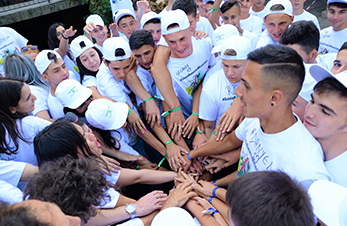
For the fifth year in a row, we continued the Vocational Romania project in Romania. The project is one of the most comprehensive projects promoting the development of vocational school students in the country. In August 2019, during one of the Vocational Summer Camps, 240 youth studying to be mechanics and electricians from 26 professional schools in the Argeș and Dâmbovița counties received professional training to be better prepared for joining the labor market. The best of the participating future craftsmen also received scholarships for the upcoming school year. Furthermore, the most innovative projects for vocational education development, submitted by the teachers taking part in the camp, were awarded grants so that the projects can be implemented in their schools. As part of our commitment to promoting vocational education in Romania, we also support the Oilmen’s School. In 2019, the second generation of well and park operators successfully graduated from the vocational school and 25 of them joined the OMV Petrom team. They joined 27 well operators who were employed from the first generation in 2018. OMV Petrom will continue to support the improvement of professional qualifications for two more generations of well operators. Lastly, the Vocational Students’ League continued to support young people in improving national policy on vocational education.
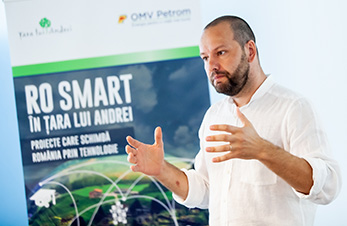
As part of the “RO SMART in Andrei’s Country” national competition in Romania, we funded eleven innovative initiatives furthering sustainable development in education, health, environment, and infrastructure in Romanian communities with a total grant budget of almost EUR 0.5 mn. One of the winning projects, “Education at Height,” provides students in the remote Hunedoara Mountains live lessons by qualified teachers from the exact locations featured in the lessons. Another winning project helps 10,000 pupils from 100 disadvantaged rural and urban areas to access digitized Junior Achievement Modules for Life Skills Development focused on cross-curricular entrepreneurial, financial, and vocational guidance.
In Tunisia, we continued investing in community and social projects focusing on entrepreneurship. In 2019, we launched a “TAHADDI” (Arabic for “challenge”) initiative offering dismissed workers a path to alternative employment or self-employment. TAHADDI has received 400 applications. A steering committee selected 80 beneficiaries to benefit from self-employment support, including entrepreneurship training, seed money, and post-business-creation coaching. 40 beneficiaries will also be selected for two pilot vocational training programs in scaffolding and domestic gas and appliances installation. In the Gabès area, OMV supported the creation of an innovative entrepreneurship lab at the Gabès Chemical Engineering School, the first and only engineering school offering higher education degrees up to doctorate level in chemical and process engineering in Tunisia. The lab will support environmental research and innovation, while also helping graduating chemical engineering students to mature their business ideas into executable business plans.
In Yemen, OMV aims to contribute to the long-term development of local communities by supporting education. 15 local students were able to attend universities due to OMV paying their tuition for the 2018/19 academic year. OMV scholarships allow students to study in various medical and engineering programs in accredited universities across Yemen. Partners in this program include the local authorities in the Shabwah Governorate and various universities.
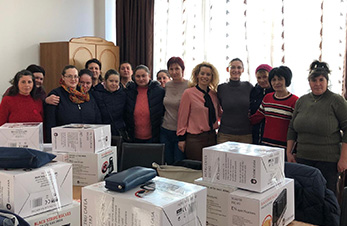
In Romania, OMV Petrom continued to support entrepreneurship training for local communities. In 2019, we supported courses in sewing, weaving, and other Romanian traditional handicrafts for unemployed women. Other training topics included recycling and the production of handmade paper, hand weaving, reed processing, and woodworking. In addition, a hairdresser training program for socially disadvantaged people included entrepreneurship training and financial support for purchasing professional equipment and starting their own businesses. We also focused on developing young students’ skills in building successful business plans and provided early career advice for jobs in the field of traditional Romanian and other crafts. Lastly, our “Craftsmen 21” project aimed to identify local craftsmen and help them create goods with modern designs by using traditional techniques and materials. The project also provided assistance with promoting and selling their products. In total, 180 people in Romanian communities have benefited from the above trainings and programs for enhancing their entrepreneurial and career potential in 2019.
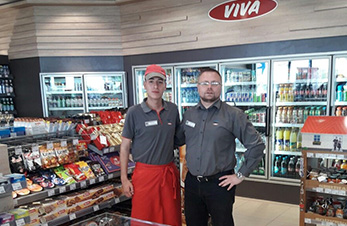
In Serbia, we continue to run a partnership with Caritas that provides work experience and mentoring to young adults from SOS Children’s Villages on their path to independence and employment. In 2019, two young persons conducted their ten-month work placements at our filling stations. We also collaborate with Malteser International in Hungary, SOS Children’s Villages in Bulgaria and Serbia, and other organizations in Slovenia and Germany supporting the education and personal growth of children and young adults, particularly those from underprivileged communities.
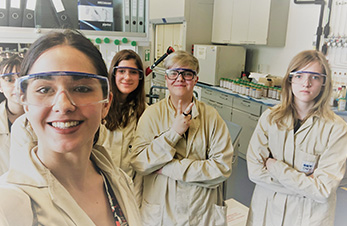
In Austria, we continued encouraging young women to pursue technical career fields. Sixty girls learned more about different career paths in technical professions while visiting OMV’s operations (Upstream, Head Office, and the Schwechat refinery) during the Girls’ Day initiative. Moreover, to advance social inclusion in Austria, we supported the fuelService application, which allows drivers with disabilities to find an appropriate filling station and helps them with refueling their vehicles.
More details on these and other projects supporting SDGs
and
can be found at: www.omv.com/en/projects-initiatives
Climate action
Impact snapshot: access to energy and energy efficiency
- 63 low-income households in New Zealand and 4 municipalities in Romania improved their energy efficiency, saving 69 t of CO2 equivalent.1Estimated in 2019 only. 2019 activities will generate CO2e mitigation during an impact lifespan of the next 13 years (public lighting energy efficiency in Romania) and 30 years (WISE Better Homes).
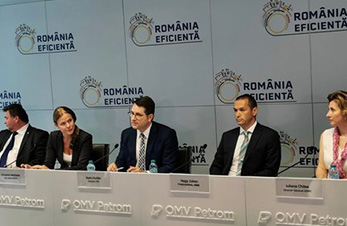
As the largest player on the Romanian energy market, OMV Petrom endorsed the “România Eficientă” program aiming to promote energy efficiency at the national level through public information campaigns, education programs, and financing of projects for improving the energy efficiency of public buildings. The program is run by the Energy Policy Group (EPG). OMV Petrom will contribute EUR 4 mn to this program in the period from 2019 to 2022.
In Romania, we also funded a public lighting efficiency initiative in four communities in Gorj county. The initiative replaced existing bulbs with 1,667 efficient and economical LED lamps, which increased the energy efficiency of public street lighting, improved the quality of public lighting, reduced electricity costs, and contributed to protecting the environment.
In terms of access to energy in New Zealand, we continued our collaboration with the WISE Better Homes initiative, funding insulation for 63 low-income family homes to improve their energy efficiency and reduce respiratory health issues. In Austria, Bulgaria, and Serbia, we provided donated fuel and heating vouchers to non-governmental organizations working with underprivileged people.
Impact snapshot: Circular waste management
- 25,000 people increased their awareness of circular waste management in Romania, and 2,060 kg of waste was collected in Norway.
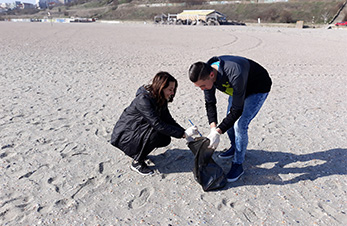
In Romania, we ran two projects in Constanța county, which borders the Black Sea. These aimed to address the issue of mismanaged waste. The “Recycling Laboratory” project developed informational materials and guidelines on the types of recyclable wastes generated by Romanian households, their recycling methods, and recycling locations in Constanța city. The project was implemented in partnership with the Oceanic-Club NGO, the Grigore Antipa National Museum of Natural History, the Constanța County School Inspectorate, and the Constanța Ovidius University. We reached 25,000 people to raise public awareness of recycling of domestic waste. The project also recognized ten business plans focusing on waste utilization developed by students in Constanța county. The #noplasticwaste project in Romania focused on raising public awareness among residents and tourists for more sustainable behavior, especially decreasing quantities of non-recycled plastic. The project developed an educational platform for sustainable development in educational institutions in Constanța county and ran a public waste collection and awareness-raising campaign. Project partners included the Mare Nostrum NGO, the Constanța County School Inspectorate, the Constanța Ovidius University, and the Dobrogea-Litoral Water Administration.
In New Zealand, Taranaki schools were rewarded for their recycling efforts with tree donations through our support of Paper4Trees. In 2019, we donated 1,308 trees to 119 schools to plant on their school grounds and in their local community. By avoiding the landfilling of paper waste, the project contributed to a reduction of 16 t CO2e2Estimated in 2019 only. 2019 activities will generate CO2e mitigation during an impact lifespan of the next 10 years. in 2019.
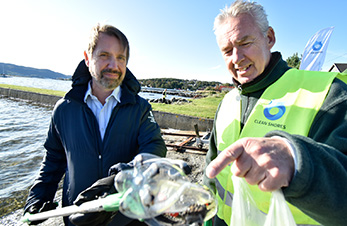
In Norway, we started a partnership with the Clean Shores NGO. As part of this cooperation, we organized OMV volunteers to take part in beach clean-ups in Norway. The collected waste was then recycled in local recycling facilities. In 2019, 50 volunteers, including top management, took part.
Impact snapshot: Natural climate solutions
- 77,450 trees were planted by 885 OMV volunteers sequestering 213 t of CO23Estimated in 2019 only. 2019 activities will generate CO2e mitigation during an impact lifespan of the next 20 years. in Austria, Romania, Serbia, and New Zealand.
Natural climate solutions, i.e., conservation, restoration, and land management actions that increase carbon storage or avoid greenhouse gas emissions in landscapes and wetlands across the globe, are a key ingredient in addressing the challenges of climate change. In 2019, natural climate solutions also became a part of our social investment portfolio.
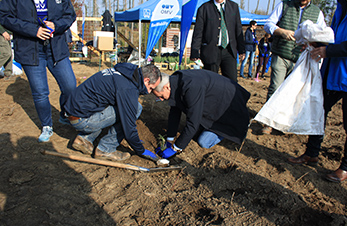
In 2019, we partnered with the Austrian Research Center for Forests (BFW) to support a research project, Climate-Research Forest, studying the role and adaptation of forests to climate change in Austria. Forest protection and restoration are key climate change mitigation measures due to the particular effectiveness of forests in absorbing CO2 from the atmosphere. However, with growing pressures on ecosystems, forests also need to adjust to changing conditions. BFW provided verification of the Climate-Research Forest on three plots of land in eastern Lower Austria near OMV operations. In the next stages of the project, BFW will cultivate, manage, and study the growing trees.
Research will be conducted on different types of forests consisting of native and non-native trees to examine their synergies and properties in the face of changing climate conditions. The project will also yield insights into the impact of reforestation on areas that most recently lacked tree stocks and encourage biodiversity. From 2021 onward, the Climate-Research Forest will be opened to the public for recreational purposes and will be supplemented with a nature trail inviting visitors to discover more about nature and the importance of woodlands.
In October 2019, 40 volunteers from OMV, including the OMV Group’s top management, planted the first trees for the Climate-Research Forest under the expert supervision of BFW. A total of around 750 trees were planted for the project on an area measuring 0.4 ha.
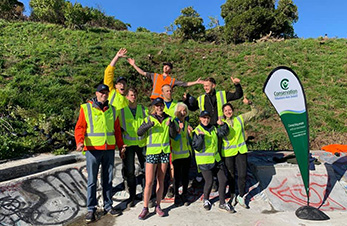
Our employee volunteers have also been actively engaged in forestation efforts in Romania, Serbia, and New Zealand. In New Zealand, our local OMV team won a World Environment Day challenge, planting 380 trees in just two hours.
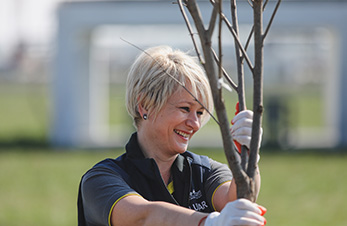
In Romania, we held two tree plantings involving 800 OMV Petrom and 2,100 public volunteers. As a result, 13.9 ha were reforested with trees. In Serbia, two forestation campaigns were organized in partnership with Serbia Forests (Srbijašume) and a total of 5,000 trees planted.
More details on these and other projects supporting SDGs
and
can be found at: www.omv.com/en/projects-initiatives